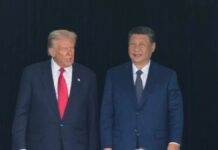The repercussions of US customs duties affect Apple and Tesla, causing them huge losses.
The largest technology companies face US economic shocks mounting Due to the customs duties imposed by former US President Donald Trump, these policies were clearly reflected in the shares of Apple and Tesla, which suffered losses that exceeded their counterparts from major companies.
Apple, Tesla shares fall amid market turmoil
Financial markets were rattled on Monday by concerns over the implications of new tariffs that Trump is seeking to impose, sending Tesla shares down 5%, the biggest drop among the “Big Seven” stocks, which include the largest U.S. companies by market value.
Apple shares also fell 3% on the same day, affected by the escalating trade moves between the United States and China, according to the website. Fortune.
China’s response and its impact on the technology sector
With China announcing counter-tariffs Tuesday morning, Apple clawed back some of its gains, rising 2% as investors assessed the company’s ability to cope with continued trade tensions.
Tesla, however, remains the most affected, given its reliance on interconnected supply chains that span Canada and Mexico, making it vulnerable to the proposed 25% tariff on imports from those two countries.
Trump’s 10% tariffs on Chinese goods won’t have a major impact on Apple’s profits, even if it doesn’t get the exemptions it was previously granted, Bank of America estimates.
Analyst Wamsi Mohan said the potential negative impact on earnings per share would be no more than $0.05 if the company did not raise prices of its devices in the United States.
Alternatives to manufacturing outside China
As trade tensions escalate, Apple is looking to reduce its reliance on China, with Bank of America estimating that 80% of the company’s products sold in the United States could be manufactured outside China.
Apple will now be able to produce most iPhone models in India, with manufacturing partners able to ramp up production in South Asia to provide suitable alternatives in case of escalation of tariffs, analysts said.











